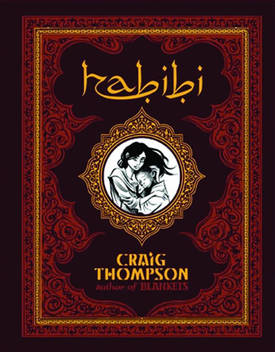 I finished Craig Thompson's Habibi last week, and I've spent that time trying to decide what to say about the graphic novel.
I finished Craig Thompson's Habibi last week, and I've spent that time trying to decide what to say about the graphic novel.Epic is the first word that comes to mind. The two protagonists, Dodola and Zam, begin the tale as children living in an abandoned boat in the midst of a desert wasteland; later the scene shifts to a city that is a post-industrial wasteland. Everything in the world is wrong, and people are the problem. Thompson does a fantastic job of pulling back on the drumbeat whenever his political/ social/ environmental message threatens to become to ham-handed. For any other writer, Habibi would represent an artistic pinnacle. But Thompson is not any other writer; I'll try not to hold it against him.
They survive on their ark because Zam has a talent for finding water, while Dodola trades sex for food from passing caravans. Dodola is Zam's foster mother, barely a teenager yet fully an adult, teaching the boy and caring for him above her own safety.
Sex is the only constant in Habibi's world- from the open chapter (recounting one version of Dodola's wedding night as a child-bride) through all Dodola and Zam's adventures and misadentures. I think Thompson wanted us to view Dodola as a strong character, someone who uses the only weapon she has in the world (her body) to her greatest advantage. And it is true that she uses her sexuality to get what she wants from merchants and sultans, but I found the repetition of the theme overwhelming and numbing. It's not that I dislike Dodola, but I find I pity her much more than I admire her. In that, she is an unusual heroine.
Sex is also a constant for Zam, whose youthful lust for Dodola confuses and shames him, who becomes a eunuch as a way to survive on the streets of the city and in an attempt to flee the confusion that Dodola inspires, who struggles to find a masculine identity when he winds up a slave in the same harem where Dodola is imprisoned and later when he finds himself unable to provide for Dodola financially, emotionally or physically.
In Habibi, Thompson plays with a number of themes: the art of storytelling; sexual and gender identity; the nexus of accountability, responsibility and morality. It is drawn in meticulously stunning black and white; it is packed with intense, intimate portraits of its characters, and the line between the characters and the calligraphic symbols that give depth to their mysticism is blurred often and elegantly.
Habibi is a great vehicle for a discussion of all these themes, but Thompson is laboring under the impossible task of following up on his masterful graphic novel memoir, Blankets. How do you top a book that was lauded as the book of the year, the book of the decade, that won the industry's highest awards for artistry, storytelling and originality? The truth may be that you can't. As beautifully rendered as Habibi is, it never hit me with the moments of gut wrenching honesty that Blankets did.


No comments:
Post a Comment